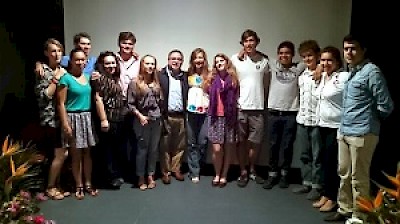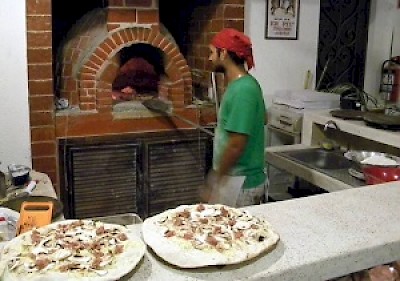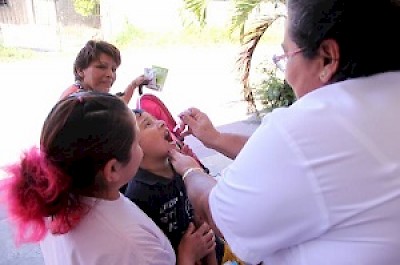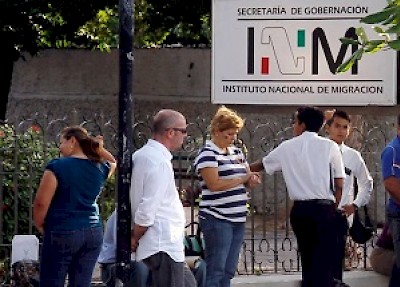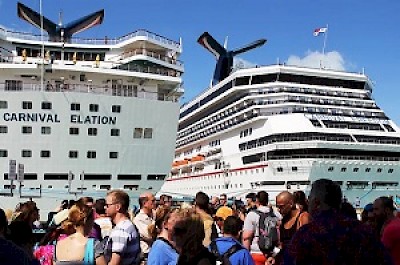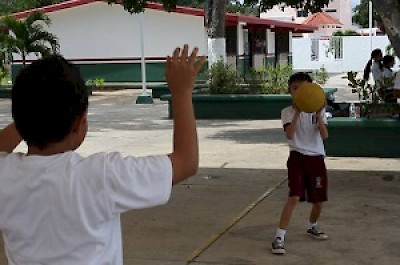Yucatan News: Art of Eating, Italy & Good Things
Local Expatriate Wins Big Award!
Expatriate David Sterling runs the popular Los Dos Cooking School, one of the first places in Yucatan to offer cooking classes in the local cuisine. Since he came to Merida in 2002 (and before from New York City), David Sterling has been researching and learning about Yucatecan food and cooking. Last year, he published a very comprehensive book about the cuisine of Yucatan, called Yucatán: Recipes from a Culinary Expedition (The William and Bettye Nowlin Series in Art, History, and Culture of the Western Hemisphere) (click on that link to order it from Amazon and support Yucatan Living...). We are happy to announce that Chef Sterling's book today won a very prestigious award, the Art of Eating Prize for best food book of the year. You can read more about David's book and the wonderful accolades it has received at the Art of Eating article announcing the $10,000 cash prize. Felicidades, David Sterling!
Maine University Students Absorb Mayan Culture
Programs of Cultural Immersion in Yucatan (PICY) has just held its First Yucatan Intercultural University Forum. The students who shared their experiences are from Maine. One worked with an educational project for two years. The eleven others lived with local families throughout the state, and worked on gathering data for a number of cultural studies. One student lived with the family of a midwife, another lived with a family that faces communication issues with returning migrant relatives, and another went to live with a family in the smallest village in Yucatan. At the end of the 12 weeks, they came away with a treasure trove of stories that will help intercultural relationships far into the future for everyone involved.
Italy and Yucatan Join Hands in Both Places
Things can happen fast when all of the pieces of a potential project are already in place, and that’s just what has happened between Yucatan and Italy. Between the 12th and 15th of February, Italy and Yucatan both participated in an International Tourism event in Milan. Plans were already in place to increase flights between Merida and Milan, so the necessary money for upgrades was approved and those round trip flights will begin on April 13. Yucatan has invested $400,000 Euros to support the Yucatan in Italy program in that country for 2015. The Mexican Embassy will have free guides to “20 Wonders of Yucatan,” along with a free book on colonial churches in Yucatan. In the meantime, the Italian expat community has grown to such numbers in Merida that they now have formed their own group (la Sociedad Italomexicana Dante Alighieri de la Península de Yucatán) in Merida. Opening with 60 members in Merida, they are not simply all about being Italian. This group is truly dedicated to supporting cultural exchanges and to supporting a culture that has been kind enough to make room for all of us, no matter our expat nationality. Not to be left out, the Municipality of Merida is currently conducting courses in the Italian language for tour guides and will soon be offering tours in that language. Congratulations to Italy and to Yucatan, fast developing into intercultural role models for nations around the world.
Amazing Numbers for Health Week in Yucatan
This week is the First National Health Week in Mexico and Yucatan, as usual, is leading the way in planning and organization of the delivery of 195,000 doses of vaccines to the children of Yucatan state. Vaccinations against preventable diseases, such as polio, as well as education about diarrheal diseases and respiratory infections for those who are responsible for the care of children under five years of age, are expected to bring health information and health care delivery to over 600,000 contact points this week alone. Some of us have never seen a case of diphtheria, whooping cough or tetanus. Those of us who are old enough to remember all of the diseases mentioned above know the value of a week that will change the future for an entire generation of Yucatan’s children.
Invitation to Illegal Foreigners from INM
The National Institute of Migration (INM) has opened a program that will both regularize extranjeros (foreigners) and exempt them from fines of up to $7,000 pesos. The invitation is for anyone of any nationality. The only people who cannot get their visas straight under this program are those who knowingly attempted to obtain legal immigration status fraudulently, or who are subject to criminal prosecution, or those who have been convicted of a felony. Mexico is interested in regularizing as many foreigners as possible so that they can receive basic human rights benefits that are freely available throughout the country. The program will run from now until December 18, 2015.
Twenty New Tourist Paradores Coming to Yucatan
Ecotourism is here to stay, and Yucatan will soon be home to 20 new paradores to prove it. Paradores are partially owned and/or financed tourism areas that showcase local natural resources, such as cenotes, walking or biking trails, or areas that are breeding grounds for exotic or rare animals. These areas include restaurants, perhaps small, eco-friendly hotels or hostels, and areas where local food and crafts can be purchased. As of now, we know about new paradores coming to Rio Lagartos, Homun, Tecoh and Valladolid. We should hear something about the rest soon. Funding for these projects in Yucatan will also provide a sales catalog that will be distributed throughout the tourism industry.
Progreso Breaks Cruise Passenger Record
Progreso received 7,881 visitors in one day to break all past records for daily cruise ship visitors. The two ships both belonged to Carnival Cruises and both came to Progreso from Cozumel. One of the ships was headed back to Galveston, Texas, and the other was headed home to New Orleans, Louisiana. Cruise ship tourism has been on the increase for the past six months, supported by the hard work of the current administrations of the State of Yucatan, the cities of Merida and Progreso, and the state and federal ministries of tourism.
Childhood Rate of Obesity Down 5%
Well, this is certainly good news. The rate of childhood obesity has been addressed on two fronts. First, the provision of health services for those children who already suffer from obesity. Then, attention was turned to educating families and children so that they never have to face the high blood pressure and diabetes that, all too often, comes with childhood obesity. Between both of these sets of aggressive attention, the rate of childhood obesity has fallen 5% in Yucatan. It is expected that this rate will continue to fall and will pick up speed as it does so. Information is power and Yucatecos treasure their children above everything else, so everyone hopes that continued attention to stopping childhood obesity will result in a healthy society overall. In the meantime, congratulations are surely in order for those parents who have created an environment in which their children need never fear childhood obesity in the first place.
Chichen Itza: Second Most Visited Tourism Site
As new tourism numbers continue to come in for last year, it has just been learned that Chichen Itza was the second most visited site in Mexico for 2014, even though its numbers were down by 91,542 visitors since 2013. This means that Chichen Itza recorded 2,111,875 visitors for 2014. The number of visitors to Chichen Itza, accompanied by the numbers of visitors to Teotihuacán, Monte Albán, Palenque and Uxmal, accounted for 47% of all visitors to Pre-Columbian cities. The new Chichen Itza Light and Sound Show is part of the reason for people to come and visit this Wonder of the World again and again.
Rolly Brook, Our Online Friend
Rolly Brook was 68 when he became an expat in Mexico and 83 years of age when he died just last week (February 25). By that time, Rolly Brook had shared the last 15 years of his life with expats and potential expats. He was the leading resource person for information concerning all forms of visas, as well as all forms of insurance, especially health insurance in Mexico. Rolly was a mentor to other forum administrators who watched in awe as he dealt with the difficulties of administering and monitoring a forum. ... and Rolly, along with two friends, wrote "the book" on Moving to Mexico. All of us - even those of you who are only considering becoming an expat in Mexico - have lost more than we can imagine. Please take some time to go back through Rolly's blog My Life in Mexico and read about what daily life as an expat was like for him.
Don’t Forget to Talk About the Good Things
Merida, Yucatan, Thursday, February 19, 2015. An article in SIPSE talked about a recent meeting in which we think you might be interested. The representative, in Mexico, of Safe Communities for Latin America and the Caribbean, Maria Isabel Gutierrez Martinez called for the dissemination of information concerning successful government programs, and for the preserving and improvement of successful government programs, in order to raise the quality of life for citizens.
When verifying the certification process of 21 programs in the Municipality of Merida, the Director of the Institute CISALVA, the certification center for Safe Communities for Latin America and the Caribbean, spoke of the need to show successful government programs to the world, as well as to continue talking about social conflicts.
“We have to show the good things we have, to demonstrate to the world that not only bad things happen in Mexico. We have to show the world the good things that are done in Mexico as a result of government actions, and the impact of those good things on the lives of the people who live in the communities... We must show the success stories of leadership and governance of a mayor, for his team, and also for civil society in the community where they do many good things,” she said.
The movement for safe communities – which was born in Colombia – is recognition of good deeds and the sustainability of those good deeds that are done by a government to their community. She recalled that some 350 communities in the world are part of Safer Cities, “a comprehensive security movement,” which the councilors can access electronically for free, to hear cases of successful safety programs, good governance, and budget transparency, among others.
In regard to the difference between the programs available in the Safer Cities Program vs. other cities worldwide, the Mayor of Merida, Renan Barrera Concha, acknowledged that one of the problems of municipal governments in Colombia, Mexico and the world “has been the lack of permanence of many programs that have permeated positively in society and must be reinvented or redesigned every three years.”
We are happy to hear that some of the problems have been acknowledged and that people in government are working to keep Merida and the Yucatan safe for all of us.







